|
Printables |
PowerPoints |
Online exercises |
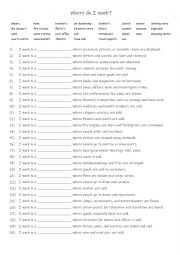
|
A1+-A2 Where do I work 30 job descriptions 1
Learning this vocabulary is essential as it helps students accurately identify and describe places where specific activities, goods, or services occur. It improves practical communication skills for everyday interactions, such as asking for directions or discussing jobs. Additionally, understanding these terms enhances cultural awareness, enabling ...
Level: elementary
Age: 8-100
Type:
Downloads: 103
|
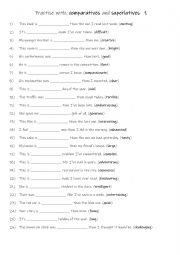
|
A1+-A2 Practise with comparatives and superlatives 1
Students should learn comparatives and superlatives as they are essential for effective communication, allowing them to describe differences and extremes clearly. These structures enhance critical thinking by enabling comparison and evaluation, which are vital for forming opinions and writing arguments. Additionally, they are frequently used in eve...
Level: elementary
Age: 8-100
Type:
Downloads: 120
|
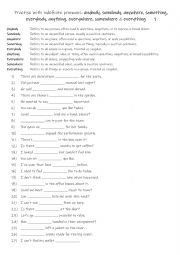
|
A2-B1 Practise with indefinite pronouns anybody, somebody, anywhere, something, everybody, anything, everywhere, somewhere & everything 1
Learning indefinite pronouns like anybody, somebody, anywhere, something, everybody, anything, everywhere, somewhere, and everything is essential for students to express general ideas or refer to non-specific people, places, or things. These pronouns are commonly used in everyday communication to ask questions (e.g., "Is there anybody here?"), make...
Level: intermediate
Age: 9-100
Type:
Downloads: 101
|
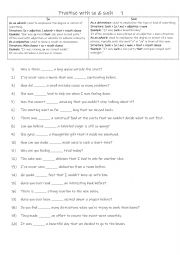
|
A2+-B1 Practise with so & such
Practising with so and such is important because these words help students emphasise qualities, making their language more expressive and precise. So is used with adjectives and adverbs (e.g., "She runs so quickly"), while such is used with noun phrases (e.g., "It was such a beautiful day"). Learning to use them correctly allows students to enhance...
Level: elementary
Age: 8-100
Type:
Downloads: 106
|
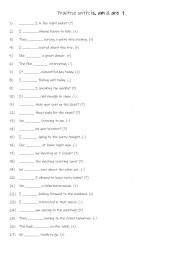
|
A1 Practise with is, am & are 1
Students should practise is, am, are, is not, am not, and are not because these forms of the verb to be are crucial for constructing present tense sentences, expressing states, identities, and descriptions, and forming affirmative, negative, and interrogative sentences. Mastery of these basics provides a foundation for learning more advanced gramma...
Level: elementary
Age: 7-100
Type:
Downloads: 106
|
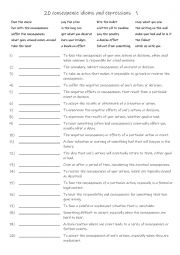
|
B1+-C1 20 consequence idioms and expressions 1
Learning idioms and expressions related to consequences, such as face the music, bite the bullet and reap what you sow, are essential because they enrich communication and help convey complex ideas succinctly. These phrases allow students to describe cause-and-effect situations, personal responsibility, or the ripple effects of decisions with cultu...
Level: intermediate
Age: 10-100
Type:
Downloads: 143
|
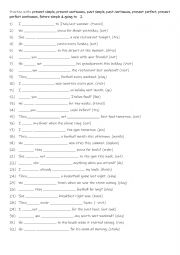
|
A2+-B1 Practise with present simple, present continuous, past simple, past continuous, present perfect, present perfect continuous, future simple & going to 2
Students should learn to practise tenses like the present simple, present continuous, present perfect simple, past simple, past continuous, will future, and going to because they are essential for expressing actions in different time frames. These tenses help students describe routines, ongoing events, past experiences, and future plans clearly and...
Level: intermediate
Age: 9-100
Type:
Downloads: 132
|
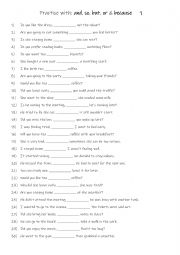
|
A1+- A2 Practise with and, so, but, or & because 1
Students should learn conjunctions like and, so, but, or, and because as they are fundamental for creating cohesive and meaningful sentences. These words help connect ideas logically, express relationships like addition, contrast, cause-and-effect, and choice, and improve the overall flow of speech and writing. By mastering these conjunctions, stud...
Level: elementary
Age: 9-100
Type:
Downloads: 122
|
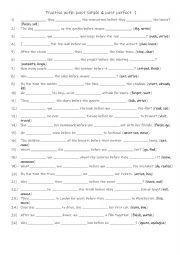
|
A2-B1 Practise with past simple & past perfect 1
Students should learn the past simple and past perfect because they are essential for discussing events in the past with clarity and accuracy. The past simple is used to describe completed actions or events that happened at a specific time (e.g., "She travelled to France last summer"), making it crucial for storytelling and recounting past experien...
Level: intermediate
Age: 10-100
Type:
Downloads: 117
|
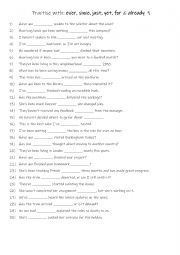
|
A2+-B1 Practise with ever, since, just, yet, for & already 1
Students should learn ever, since, just, yet, for, and already because they are essential for expressing time relationships and mastering perfect tenses. These words allow students to ask about experiences (ever), specify starting points (since), describe recent actions (just), highlight incomplete tasks or questions (yet), express durations (for),...
Level: intermediate
Age: 9-100
Type:
Downloads: 121
|
|
|
|
|












